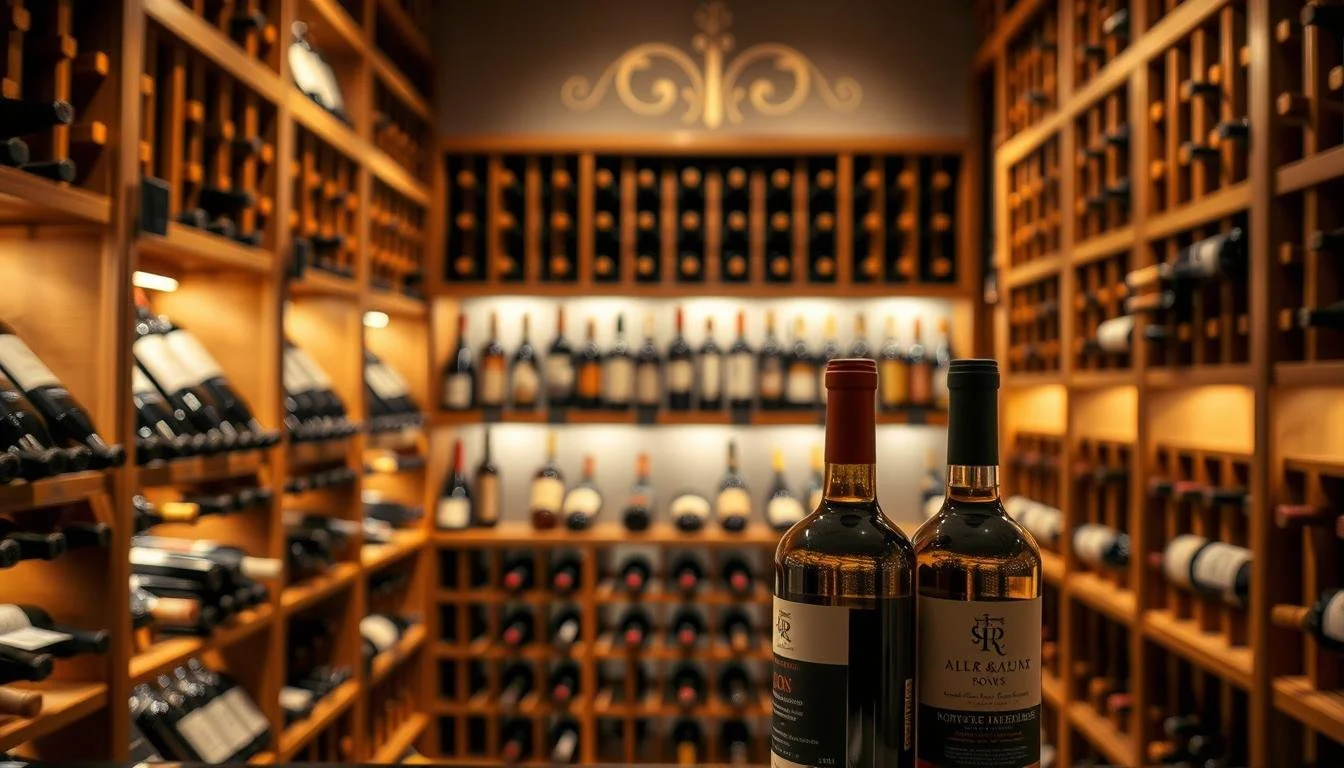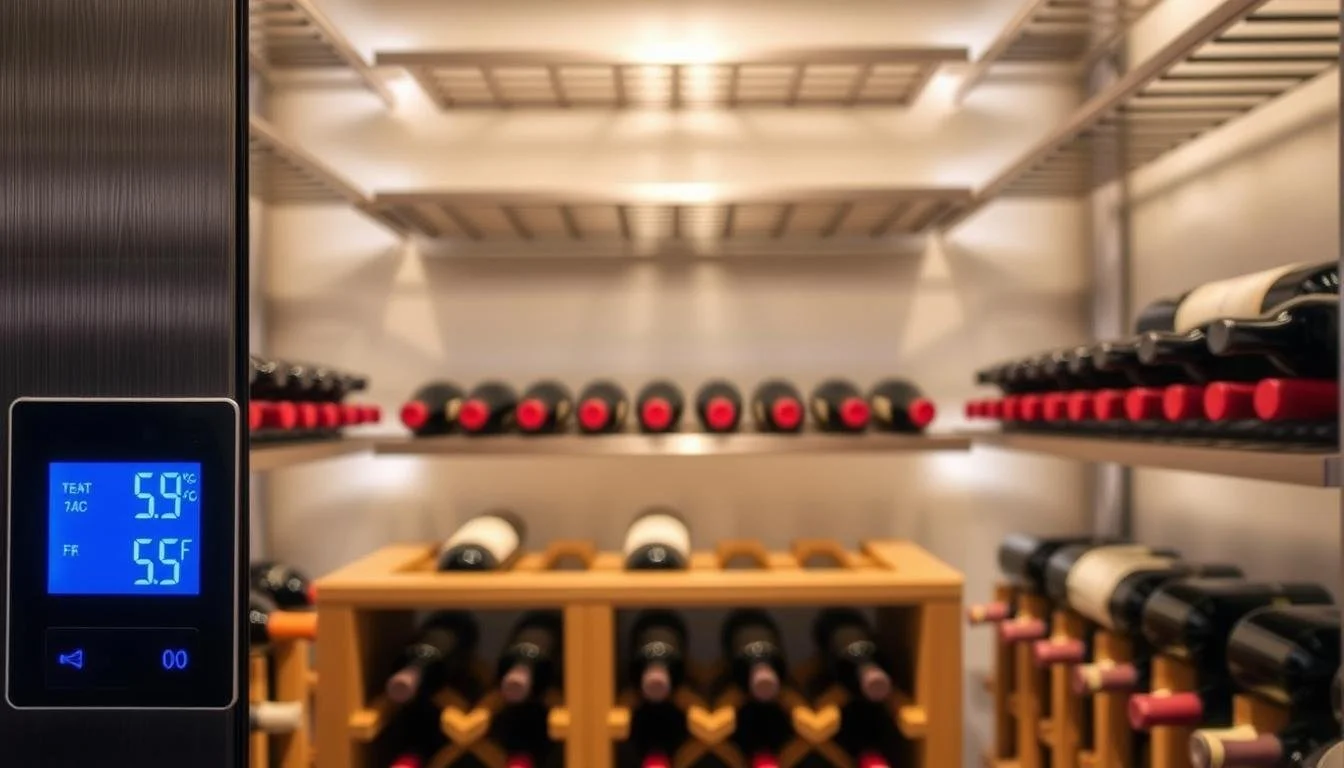Wine Storage 101: Essential Tips for Proper Wine Preservation
Wine Storage 101: Essential Tips for Proper Wine Preservation
Welcome to Wine Storage101, your guide to keeping your wine collection perfect. It's key to keep your favorite bottles tasting great.
Storing wine at home needs careful thought. The right conditions mean controlling temperature and humidity.
In this article, we'll cover the basics of storing wine right. We'll talk about affordable storage options and the need for a stable environment for your wine collection.
Key Takeaways
Understand the ideal conditions for wine preservation.
Learn how to maintain the perfect temperature and humidity levels.
Discover the best storage solutions for your wine collection.
Protect your investment with proper wine storage techniques.
Enjoy your wine to the fullest with our expert tips.
The Fundamentals of Wine Storage101
Learning about wine storage basics is key to keeping your wine collection in top shape. The right storage conditions are vital for keeping the wine's flavors and aromas just right.
Why Proper Storage Matters for Wine Quality
Proper storage lets wine age well, keeping its taste and smell as intended. Proper storage helps the wine's parts, like tannins and acidity, grow together over time. This is especially true for fine wines meant to age for years.
How Improper Storage Affects Flavor and Aroma
On the other hand, bad storage can harm wine quality. Too much heat, wrong humidity, and light can spoil the wine. For example, high temperatures can speed up chemical changes, making the flavor off-balance. Dry air can also cause corks to shrink, letting air in and spoiling the wine.
By managing these factors, wine lovers can keep their collection in perfect condition. This way, their wine is always ready to be enjoyed at its finest.
The Critical Role of Temperature in Wine Preservation
The right temperature is key to keeping wine's flavors and aromas fresh. It greatly affects how wine ages and develops its taste over time.
Red wines need a temperature between 55°F to 65°F (13°C to 18°C) for the best storage. White wines, on the other hand, do well at a cooler range of 45°F to 55°F (7°C to 13°C). Keeping wine at the right temperature is crucial for maintaining its quality and ensuring it ages well.
Ideal Temperature Ranges for Red vs. White Wines
Red wines, with their bold flavors, can handle warmer temperatures. This warmth helps mature their complex tastes. White wines, being fresher and more delicate, need cooler temperatures to keep their crispness and acidity.
How Temperature Fluctuations Damage Wine
Temperature changes can harm wine quality. When wine's temperature swings, it can expand and contract. This might damage the cork, leading to oxidation. Oxidation spoils the wine's taste and smell. Keeping a steady temperature is vital to avoid this damage.
Creating a Consistent Temperature Environment
To keep a steady temperature, consider a wine fridge or cooler. These devices are made to store wine at the perfect temperature. If you don't have one, a cool, dark spot with a stable temperature works too. Always check the temperature to make sure it's right for your wine.
Humidity Considerations for Optimal Wine Storage
Keeping the right humidity level is key for wine storage. It's important for the health of the cork. This affects the quality of your wine.
The Perfect Humidity Level for Cork Health
The best humidity for wine storage is between 50% and 70%. This keeps the cork moist. It prevents air from getting into the bottle.
Preventing Dry Cork and Oxidation Issues
A dry cork can cause oxidation. This harms the wine's taste and smell. Oxidation makes wine taste flat and sharp.
Practical Solutions for Controlling Humidity
To manage humidity, use a humidifier or dehumidifier. Wine cellars need climate control systems. Check the humidity often to keep your wine perfect.
Protecting Your Wine from Light and Vibration
Storing wine right is more than just keeping it cool. It also means protecting it from light and vibration. These can harm your wine's quality, making it worse over time.
Why UV Rays and Sunlight Damage Wine
UV rays and sunlight can start chemical reactions in wine. This leads to bad tastes and smells. So, it's key to keep wine in a dark spot, away from sunlight and UV rays.
Creating a Dark Storage Environment
To shield your wine from light, store it in a cellar or a room with little natural light. If that's not doable, use UV-blocking materials or wine storage units with UV protection. This helps reduce light exposure.
Minimizing Vibration and Movement
Vibration and movement can upset the sediment in wine bottles. This mixes it with the liquid, harming the wine's quality. To avoid this, keep your wine in a steady place, away from vibrations like washing machines or foot traffic.
Proper Bottle Positioning for Long-Term Storage
Keeping your wine bottles in the right position is key to keeping your wine quality high. The way you store your wine can affect the cork's moisture and how the wine ages.
The Science Behind Horizontal Storage
Storing wine bottles horizontally is a common method, especially for long-term storage. This keeps the cork in touch with the wine. This prevents the cork from drying out.
When the cork stays moist, it stays elastic. This keeps the bottle sealed well.
Keeping the Cork Moist and Sealed
A moist cork is vital to keep air out and the wine fresh. Horizontal storage keeps the wine touching the cork. This keeps it moist and stops it from shrinking.
When Vertical Storage Is Appropriate
While horizontal storage is best for long-term storage, there are times when vertical storage is okay. For example, if you'll drink your wine soon, or if it's a screw-top bottle. In these cases, vertical storage won't cause big problems.
Wine Storage Solutions for Every Budget
Whether you're a casual wine collector or a serious connoisseur, there's a wine storage solution for you. The goal is to keep your wine quality high. There are many options to fit different budgets.
Wine Refrigerators and Coolers: What to Look For
Wine refrigerators and coolers are great for dedicated wine storage. Look for size, temperature control, and humidity management. Brands like Sub-Zero and Liebherr offer top-notch wine refrigerators.
Building or Converting a Wine Cellar Space
Building or converting a wine cellar offers a luxurious storage experience. It's about creating a perfect climate for long-term wine storage. Think about insulation, temperature control, and UV-free lighting.
Affordable Storage Options for Casual Collectors
Not everyone needs a fancy wine cellar or refrigerator. Luckily, there are affordable options like wine racks and cabinets. They're great for storing wine without breaking the bank.
Wine Racks and Cabinets
Wine racks and cabinets are both practical and stylish. They come in wood, metal, and more. Choose based on your collection size and available space.
Creative Storage Solutions
For those with limited space or a unique taste, creative storage is perfect. Think under-stair storage, repurposed furniture, or DIY projects like a wine storage ottoman.
Exploring these wine storage solutions helps you find the perfect fit. This ensures your wines age well and stay in top condition.
Organizing Your Wine Collection Effectively
To enjoy your wine collection fully, you need a good organization system. A well-organized collection makes finding bottles easy. It also helps keep your wines in top condition.
Inventory Systems for Tracking Your Wines
Start with an inventory system to organize your wines. You can use a simple spreadsheet or a fancy app. It's important to track when you bought each wine, its vintage, and where you store it.
Arranging Bottles by Drinking Windows
Organize your bottles by when they're best to drink. This means sorting them by type, vintage, and storage. This way, you know when each wine is ready to enjoy.
Separating Everyday Wines from Special Occasions
Keep your everyday wines separate from those for special events. This makes it easy to pick the right wine for any occasion. It ensures you're always ready to impress.
With these tips, you can fully enjoy your wine collection. Every bottle will be savored at its peak.
Conclusion: Elevating Your Wine Experience Through Proper Storage
Proper wine storage is key to keeping your wine's quality and taste. By following the tips in this guide, you can make your wine experience better. Whether you're a wine collector or just starting, good storage is vital to protect your wine.
Keeping the right temperature, humidity, and light is important for wine preservation. A consistent storage environment helps your wine age well and keep its special qualities.
With the right storage, you can improve your wine experience. You can choose from wine refrigerators to cellar spaces, depending on your budget and needs. By focusing on proper storage, you can enjoy your favorite wines at their best.
FAQ
What is the ideal temperature for storing wine?
The best temperature for wine storage is between 45°F and 65°F. Most wines age well between 55°F and 58°F.
How often should I check on my stored wine?
Check your stored wine every 6-12 months. This ensures the storage conditions are right and the wine is good.
Can I store wine in a garage or attic?
No, don't store wine in garages or attics. These places have bad temperatures, humidity, and light, which harm wine.
How do I store wine bottles to keep the cork moist?
Store wine bottles on their side. This keeps the cork moist and stops oxidation.
Can I store red and white wine together?
Yes, you can store red and white wine together. But, keep them at different temperatures. Use a wine storage unit with separate controls for this.
What is the best way to protect my wine from light?
Store wine in a dark place or use UV-resistant materials. A wine storage unit with UV protection works well too.
How do I organize my wine collection?
Use an inventory system to track your wines. Arrange bottles by drinking window or type. Keep everyday and special wines separate.
Can I store wine in a wine fridge or cooler?
Yes, a wine fridge or cooler is great for storing wine. It keeps the temperature and humidity steady. Just pick a unit made for wine and follow the instructions.
How long can I store wine?
The storage time for wine varies. It depends on the wine type, storage, and quality. Most wines are best within a few years. But, some top-quality wines can last decades.



